MercoPress. South Atlantic News Agency
Tag: economy
-
Wednesday, May 30th 2018 - 09:26 UTC
Global markets and the Euro his hard by the Italian political stalemate

Asian equities and the euro sank Wednesday as turmoil in Italy sparked a frantic dash for safety, while investors have also been spooked by fresh worries about the China-US trade row. Global markets have been sent into a tailspin as a political crisis unfolding in Rome has thrust the stability of the Euro zone and European Union back on to the agenda.
-
Wednesday, May 23rd 2018 - 08:24 UTC
In controversial vote US Congress rollbacks 2010 banking regulations
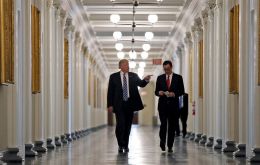
United States lawmakers passed Tuesday the first major rollback of banking regulations enacted after the financial crisis that were aimed at protecting taxpayers from fresh economic trauma and new bank bailouts.
-
Thursday, May 17th 2018 - 18:02 UTC
IEA: High Oil Prices “Taking A Toll” On Demand
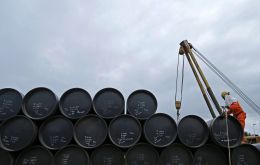
Geopolitics has taken over the oil market, driving oil prices up to three-year highs. The inventory surplus has vanished, and more outages could push oil prices up even higher. Yet, there are some signs that demand is starting to take a hit as oil closes in on $80 per barrel.
-
Wednesday, May 9th 2018 - 20:19 UTC
US Dollar rises: Uruguay behind Argentina
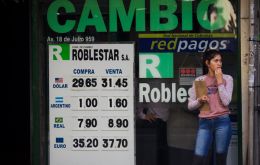
After several days up in Argentina, the devaluation of the Argentine peso and the rise of the US dollar have had some impact on the other side of the River Plate, where the exchange houses of downtown Montevideo marked on Wednesday the value of the currency up to 31,70 Uruguayan pesos per dollar, a rise of 2.08% compared to Monday —the highest in five years—. For the Uruguayan government, the country follows the global trend and calls for calm, beyond the noise generated in Argentina, which is beginning a dialogue between the Finance Minister, Nicolás Dujovne, and the International Monetary Fund (IMF) in Washington.
-
Tuesday, May 8th 2018 - 08:19 UTC
Boosted by mining and consumption Chilean economy activity soars 4.6% in March
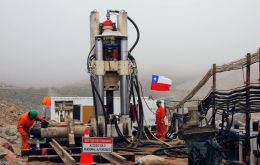
Chile's economic activity rose 4.6% in March from the same month a year ago, its sharpest rise in five years, with a boost from rising consumption and a strengthening mining sector, the central bank said on Monday. The Monthly Economic Activity Indicator (IMACEC) of the third month compares with a 4% rise in February.
-
Thursday, May 3rd 2018 - 08:44 UTC
Uruguay´s soybean crop forecasted to drop 43% because of devastating drought

Due to the recent devastating drought, soybean production in Uruguay is forecast to drop to 1.7 million tons in 2017-18, according to an April 30 Global Agricultural Information Network (GAIN) report from the U.S. Department of Agriculture.
-
Thursday, May 3rd 2018 - 08:13 UTC
Euro zone economy grows faster than the UK in the first quarter
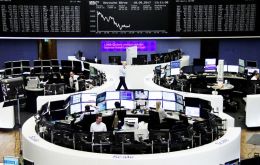
The European Union economy slowed in the first quarter of the year, official Eurostat figures have showed. Economic growth in the Euro zone slowed to 0.4% for the period from January to March 2018, compared with 0.7% in the previous quarter. Growth in the 19-country single currency bloc reached 2.5% year-on-year.
-
Wednesday, April 18th 2018 - 08:38 UTC
Chinese economy expands at an annual rate of 6.8% in the first quarter, says Beijing
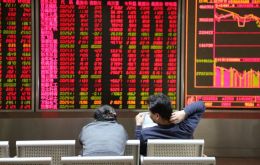
China's economy grew at an annual pace of 6.8% in the first quarter compared to the same period last year, according to official data, beating forecasts for the period. The growth figures for January to March were also above Beijing's 2018 annual growth target of “around 6.5%”
-
Tuesday, March 27th 2018 - 09:42 UTC
The World's Biggest Investors Have Lost $436 Billion In 2018

Wall Street is shocked, but it shouldn't be: Tariffs targeting China should have been a given, and now the market's tanking on trade war fears as if it just crept up on everyone, but Trump's been very clear on this.
-
Thursday, February 15th 2018 - 09:37 UTC
For the first time in seven years, Euro-zone economy grew faster than UK in 2017
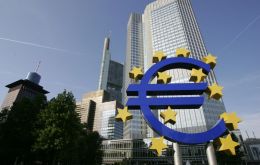
For the first time in seven years, the Euro-zone's economy grew quicker than the UK's last year, according to data from Eurostat released on Wednesday. The preliminary growth estimates for the final quarter of 2017 showed the bloc of Euro nations growing at a combined 2.7% over the course of the year, having expanded 0.6% in the final quarter alone.
